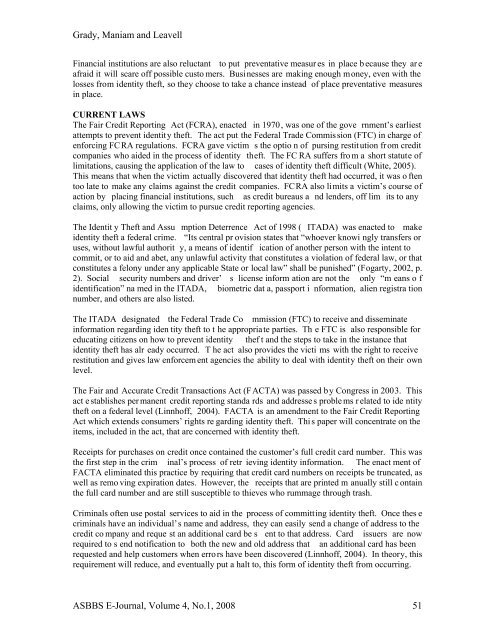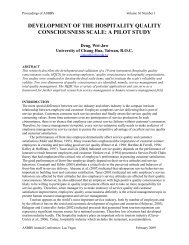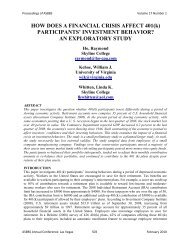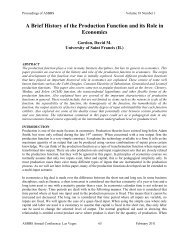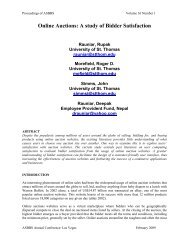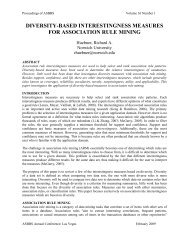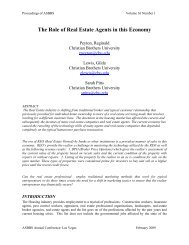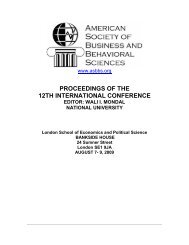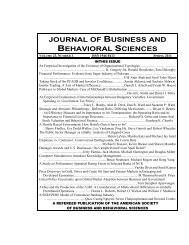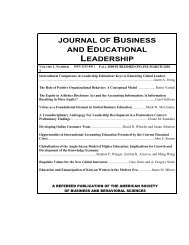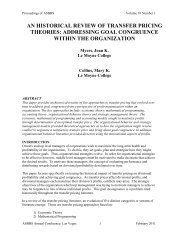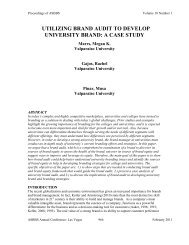stock repurchase announcements: a test of market ... - Asbbs.org
stock repurchase announcements: a test of market ... - Asbbs.org
stock repurchase announcements: a test of market ... - Asbbs.org
Create successful ePaper yourself
Turn your PDF publications into a flip-book with our unique Google optimized e-Paper software.
Grady, Maniam and Leavell<br />
Financial institutions are also reluctant to put preventative measur es in place b ecause they ar e<br />
afraid it will scare <strong>of</strong>f possible custo mers. Businesses are making enough money, even with the<br />
losses from identity theft, so they choose to take a chance instead <strong>of</strong> place preventative measures<br />
in place.<br />
CURRENT LAWS<br />
The Fair Credit Reporting Act (FCRA), enacted in 1970, was one <strong>of</strong> the gove rnment’s earliest<br />
attempts to prevent identity theft. The act put the Federal Trade Commission (FTC) in charge <strong>of</strong><br />
enforcing FCRA regulations. FCRA gave victim s the optio n <strong>of</strong> pursing restitution from credit<br />
companies who aided in the process <strong>of</strong> identity theft. The FC RA suffers fro m a short statute <strong>of</strong><br />
limitations, causing the application <strong>of</strong> the law to cases <strong>of</strong> identity theft difficult (White, 2005).<br />
This means that when the victim actually discovered that identity theft had occurred, it was o ften<br />
too late to make any claims against the credit companies. FCRA also limits a victim’s course <strong>of</strong><br />
action by placing financial institutions, such as credit bureaus a nd lenders, <strong>of</strong>f lim its to any<br />
claims, only allowing the victim to pursue credit reporting agencies.<br />
The Identit y Theft and Assu mption Deterrence Act <strong>of</strong> 1998 ( ITADA) was enacted to make<br />
identity theft a federal crime. “Its central pr ovision states that “whoever knowi ngly transfers or<br />
uses, without lawful authorit y, a means <strong>of</strong> identif ication <strong>of</strong> another person with the intent to<br />
commit, or to aid and abet, any unlawful activity that constitutes a violation <strong>of</strong> federal law, or that<br />
constitutes a felony under any applicable State or local law” shall be punished” (Fogarty, 2002, p.<br />
2). Social security numbers and driver’ s license inform ation are not the only “m eans o f<br />
identification” na med in the ITADA, biometric dat a, passport i nformation, alien registra tion<br />
number, and others are also listed.<br />
The ITADA designated the Federal Trade Co mmission (FTC) to receive and disseminate<br />
information regarding iden tity theft to t he appropriate parties. Th e FTC is also responsible for<br />
educating citizens on how to prevent identity thef t and the steps to take in the instance that<br />
identity theft has alr eady occurred. T he act also provides the victi ms with the right to receive<br />
restitution and gives law enforcem ent agencies the ability to deal with identity theft on their own<br />
level.<br />
The Fair and Accurate Credit Transactions Act (FACTA) was passed by Congress in 2003. This<br />
act e stablishes per manent credit reporting standa rds and addresse s proble ms r elated to ide ntity<br />
theft on a federal level (Linnh<strong>of</strong>f, 2004). FACTA is an amendment to the Fair Credit Reporting<br />
Act which extends consumers’ rights re garding identity theft. Thi s paper will concentrate on the<br />
items, included in the act, that are concerned with identity theft.<br />
Receipts for purchases on credit once contained the customer’s full credit card number. This was<br />
the first step in the crim inal’s process <strong>of</strong> retr ieving identity information. The enact ment <strong>of</strong><br />
FACTA eliminated this practice by requiring that credit card numbers on receipts be truncated, as<br />
well as remo ving expiration dates. However, the receipts that are printed m anually still c ontain<br />
the full card number and are still susceptible to thieves who rummage through trash.<br />
Criminals <strong>of</strong>ten use postal services to aid in the process <strong>of</strong> committing identity theft. Once thes e<br />
criminals have an individual’s name and address, they can easily send a change <strong>of</strong> address to the<br />
credit co mpany and reque st an additional card be s ent to that address. Card issuers are now<br />
required to s end notification to both the new and old address that an additional card has been<br />
requested and help customers when errors have been discovered (Linnh<strong>of</strong>f, 2004). In theory, this<br />
requirement will reduce, and eventually put a halt to, this form <strong>of</strong> identity theft from occurring.<br />
ASBBS E-Journal, Volume 4, No.1, 2008 51


